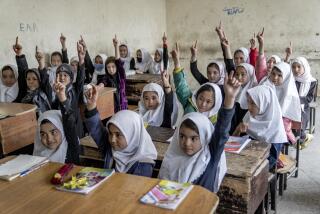Torture by Afghan forces declining, U.N. says
- Share via
Reporting from Kabul, Afghanistan — Torture of prisoners held by Afghan security forces has decreased, the United Nations reported Wednesday, praising the Afghan government for making “some progress” in reducing mistreatment of war-related detainees.
The U.N. mission in Afghanistan, citing interviews with 790 prisoners over nearly two years, said 35% of detainees were subjected to some form of torture or abuse, down from 49% in its last report, in 2011.
“The government of Afghanistan’s efforts to prevent torture and ill treatment have shown some progress over the last two years,” the U.N. special representative for Afghanistan, Nicholas Haysom, said in a statement.
Much of the progress, investigators said, was the result of a 2013 decree by former President Hamid Karzai following the U.N.’s last report, which found particularly egregious abuses by the National Directorate of Security, or NDS, the Afghan intelligence agency. Those findings led the European Union to suspend $25 million in aid to the Afghan justice system.
Haysom said torture, although illegal in Afghanistan, remains a persistent problem. Interviewees held by the NDS, the Afghan army, the Afghan national police or border police said they were subjected to a range of techniques including prolonged and severe beatings with cables, pipes, hoses and wooden sticks.
Interviewees also reported having their bodies jumped on or their genitals twisted by wrench-like devices.
Haysom said he welcomed the “immediate attention to end these practices” by new President Ashraf Ghani.
The report found that 20 of 71 detainees who had been captured by U.S.-led coalition forces experienced torture or ill treatment following their transfer to Afghan custody.
The report also mentioned evidence of alternative or unofficial places of detention operated by Afghan authorities in several regions. The U.N. called on Ghani’s government to identify and close those facilities.
Human rights groups said they remained concerned by Afghan detention practices, particularly by the NDS, which has been accused of subjecting prisoners to forced sleeplessness, tying them to chairs and threatening family members with death or imprisonment.
“Our understanding is that torture has not declined in detention facilities that have had the most serious levels of abuse in the past,” said Patricia Gossman, senior researcher on Afghanistan for Human Rights Watch.
The group was especially concerned about detainees held “outside normal facilities in order to conceal torture,” Gossman said.
Advocates said that until officials involved in torture are held accountable, the abuses will continue.
“There might be a slight decrease in the torture but this does not resolve the problem,” said Saeeq Shajjan, a Kabul-based lawyer who has handled cases of conflict-related detainees.
Shajjan said the NDS routinely denies detainees the right to a lawyer, which increased the likelihood of abuses.
“In the presence of a defense lawyer, NDS will not torture someone,” Shajjan said.
Afghan soldiers and police have taken near-total responsibility for the country’s security after U.S.-led coalition troops declared an end to combat operations in December. Defense Secretary Ashton Carter, visiting Afghanistan over the weekend, praised the Afghan forces as “a powerful force in their own right, and good partners in their own way.”
In response to the report, the Afghan government said it had launched a national program to eliminate torture in coordination with Afghan nongovernmental groups and international agencies.
“Despite the positive change, the government of Afghanistan does not see it as enough and remains strongly committed to a complete elimination of any ill treatment and torture in its detention centers,” the government said in a statement.
Special correspondent Latifi reported from Kabul and Times staff writer Bengali from Mumbai, India.
Follow @SBengali on Twitter for news out of South Asia
More to Read
Sign up for Essential California
The most important California stories and recommendations in your inbox every morning.
You may occasionally receive promotional content from the Los Angeles Times.














